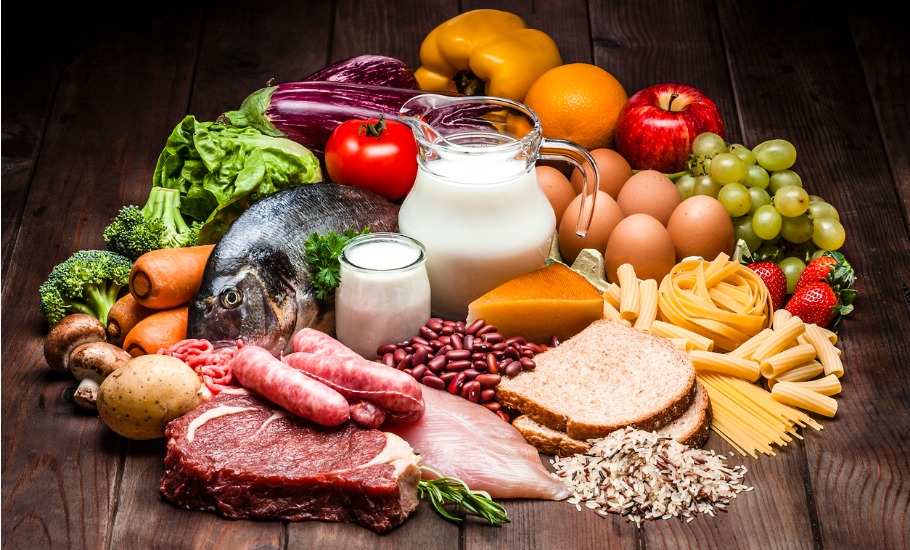
Balanced diet key to boosting immunity: Nutrition institute on COVID-19
People across the globe are consuming various foods that are rich in nutrients and can help improve their immune system for them to stay healthy in the fight against the coronavirus pandemic.

People across the globe are consuming various foods that are rich in nutrients and can help improve their immune system for them to stay healthy in the fight against the coronavirus pandemic.
According to the premier nutrition institute under the Union Health Ministry, a balanced diet comprising nutrient-rich vegetables, fruits, pulses, cereals, and curd coupled with a healthy lifestyle are the key to boost immunity.
Micronutrients (vitamins and minerals) and phytonutrients that are primarily available in fruits, nuts, vegetables and wholegrains enhance both native and adaptive immune function and prevent infection among others, the Indian Council of Medical Research (ICMR)-National Institute of Nutrition (NIN) said on Sunday (April 19) in Hyderabad.
Related news: Exercise may protect against deadly COVID-19 condition: Study
In its recommendation, the WHO European Office for Prevention and Control of Noncommunicable diseases (NCDs) said even with scarce ingredients, one can continue to eat a healthy diet.
“In order to support individuals and families in eating healthily during self-quarantine and isolation, the WHO/Europe has developed a set of general tips, a list of “best food buys”, and a few examples of recipes for inspiration,” it said.
The over a century-old NIN, which has attained global recognition for its pioneering studies on various aspects of nutrition research, has given its suggestions to the Centre on nutrition and immunity in the backdrop of the fight against COVID-19 and sent them to the Centre, its Director Hemalatha R. said.
NIN’s recommendations
It has also recommended the amount of food to be distributed as free ration for the economically deprived, daily wage earners, and migrant workers during the ongoing lockdown to keep them food and nutrition secure during these tough times, she said.
Micronutrients also aid immune memory formation that helps prevent reinfection with the same pathogen, helps scavenge toxins produced in large quantities in the body during infection and immune response, and increase beneficial probiotic bacteria in the intestine among other benefits, Dr. Hemalatha told PTI.
Fruits like papaya, guava, apple, grapes, mango, oranges, tangerines, lemons, sweet lime, and gooseberries, all seasonal vegetables, including green leafy, and spices, legumes, millets, flesh foods and fish are among those with rich sources of nutrients, she said.
“Curd is a source of many nutrients and it also improves gut health by regulating gut bacteria, aids immune function and reduces inflammation,” the Director said.
Lifestyle guidelines
Suggesting dietary and lifestyle guidelines during these times, she said consumption of highly processed foods should be limited and fruit juices and carbonated drinks should be avoided.
Consuming meat, poultry and eggs was not risky in present circumstances, but hand wash hygiene must be followed after handling raw meat, eggs or even vegetables, she said adding thoroughly cooked meat and poultry products may be included in diets in moderation.
Related news: Smell, taste loss symptoms associated with COVID-19: Study
The WHO/Europe guidelines, however, specified that the consumption of nutrient-rich foods is not the only factor important for staying healthy during the lockdown.
For optimal health, it is also important to remain physically active, they said, adding that “Limited access to fresh foods may lead to increased consumption of highly processed foods, which tend to be high in fats, sugars and salt. Such changes in eating behaviour could have a negative effect on the immune system, overall physical and mental health, and the well-being of individuals globally.”
Dietary guidelines
Avoid too much fat (no more than 30 gm per person per day – preferably more than two varieties of oils), salt (no more than 5 gm per person a day).
Sugar is just calories with no nutrients, hence, keep it to bare minimum, she said.
Maintaining ideal body weight, keeping body hydrated with adequate water intake, taking up moderate physical activity including yoga to reduce stress and build immunity and avoiding smoking and alcohol consumption are among other suggestions.
Related news: Coronavirus: The dos and don’ts you need to know
She said most infections can be prevented by practising good personal hygiene such as washing hands before preparing or eating food, washing hands after cleaning vegetables or meat, covering mouth with a tissue or cloth while coughing or sneezing.
People with diabetes or other chronic illnesses should continue their regular medication and prescribed healthy dietary patterns along with adequate physical activity and keep themselves stress-free,” Dr. Hemalatha said.
NIN’s contribution
The NIN’s website provides additional information on nutrition, including dietary guidelines.
She said the institute has recommended the required quantum of food to be distributed as free ration for people affected by the lockdown as their bit in the government’s fight against COVID-19.
Recommendation on the amount of food to be distributed as free ration for the economically deprived, daily wagers and migrants during the lockdown was provided.
Related news: COVID-19: Govt notifies hand sanitizers, masks, gloves as essential commodities
“In addition, the Centre sought inputs on nutrition and immunity from scientific and professional bodies. We have formulated our suggestions and communicated the same,” she said.
Additionally, the institute has been extending all possible support to its parent organisation ICMR in the fight against COVID 19, Dr. Hemalatha said.
The NIN has been the nodal centre in Telangana for receiving the COVID-19 test kits and reagents from ICMR and National Institute of Virology, Pune and distributing them to various test centres, she added.
(With inputs from agencies)

